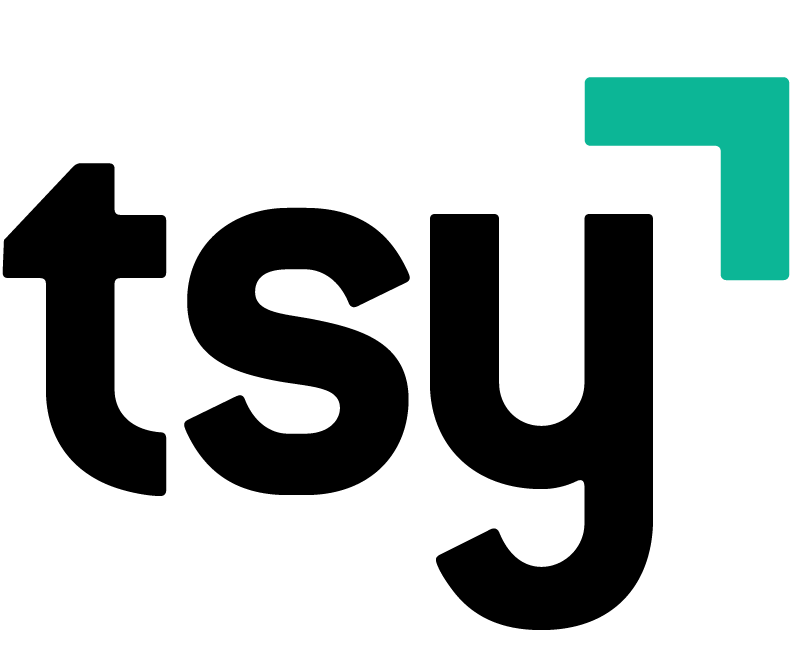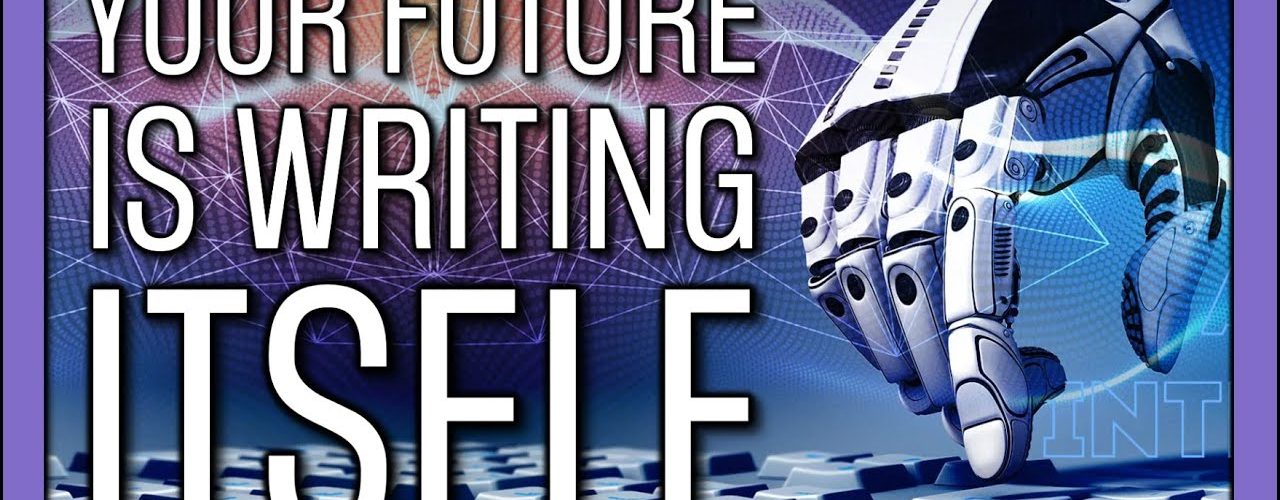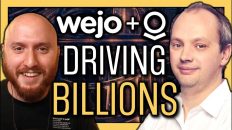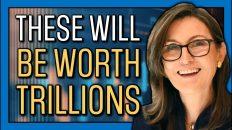Mentioned in Video:
- Episode 10 of In The Know with Cathie Wood: https://www.youtube.com/watch?v=WCBUhQ6jJoM
- Elon Musk's Warning for Humanity: https://www.youtube.com/watch?v=V4vWy4LUF1s
- Google AlphaFold Breakthrough: https://deepmind.com/blog/article/alphafold-a-solution-to-a-50-year-old-grand-challenge-in-biology
- Artificial Intelligence vs. Machine Learning vs. Deep Learning: What's the Difference (Serokell via Medium.com): https://ai.plainenglish.io/artificial-intelligence-vs-machine-learning-vs-deep-learning-whats-the-difference-dccce18efe7f
- Which is part of their ‘AI in Plain English' series: https://ai.plainenglish.io/
- Tesla Video Data Processing Supercomputer ‘Dojo' (Synced): https://syncedreview.com/2020/08/19/tesla-video-data-processing-supercomputer-dojo-building-a-4d-system-aiming-at-l5-self-driving/
- Tesla: Automatic Labeling for Computer Vision (Seeking Alpha): https://seekingalpha.com/article/4310339-tesla-automatic-labeling-for-computer-vision
- My video on ARKG, ARK Invest's Genomic Revolution fund: https://www.youtube.com/watch?v=2dIHDOA8rRA
- My video on ARKQ, ARK Invest's Autonomous Revolution fund: https://www.youtube.com/watch?v=tqMaH8U9c7g
- Spotify Uses Machine Learning Models (Neelam Tyagi):https://www.analyticssteps.com/blogs/how-spotify-uses-machine-learning-models
- Netflix Research Areas: Machine Learning: https://research.netflix.com/research-area/machine-learning
- The Singularity is Near by Ray Kurzweil: https://www.amazon.com/Singularity-Near-Publisher-Penguin-Non-Classics/dp/B004WSS8FU/
- Support the channel and get extra member-only benefits by joining us on Patreon: https://www.patreon.com/tickersymbolyou
Artificial intelligence cuts across all of #ARK Invest's actively managed ETFs (#ARKK, #ARKG, #ARKQ, ARKF, and ARKW). Google DeepMind's protein folding research has yielded a breakthrough in #AlphaFold that could impact much more than just genomics; it could impact every disruptive technology that #ARKInvest does research in. In this video, we look at the breakthrough #CathieWood discussed in Episode 10 of ‘In The Know with Cathie Wood' as well as a dire warning about artificial super-intelligence from #ElonMusk.
Video Transcript:
[00:00:00.120]
Deepmind, which is owned by Alphabet or Google, had an artificial intelligence, deep learning neural network work breakthrough. We didn't think we would see this for another six years. So something has changed here.
[00:00:19.470]
Hey there, Alex here. And this is Ticker Symbol: You, the channel that invests in you. In this episode, I discuss a recent massive breakthrough in artificial intelligence that I think is the start of something far greater than any of us realize. I put a lot of research and effort into each one of my videos and sources to everything I discuss can be found in the description below. So I'd appreciate the early thumbs up and let's dove right in. I believe we are watching the start of a new chapter for humanity and we may not be its only author.
[00:00:50.250]
The five innovation platforms upon which we base all of our research, are DNA sequencing, robotics, energy storage, artificial intelligence and blockchain technology. These platforms cut across sectors, they cut across geographies, they cut across markets. And importantly, they are converging with each other to spawn new innovation.
[00:01:20.640]
In this video, I'd like to present a different take on ARK Invest's major innovation platforms. The picture on the left shows them as five separate platforms. But as you can see on the right, artificial intelligence not only sits in the middle, but also touches the other four major platforms of innovation. My strong belief is that artificial intelligence is at the core of the convergence. That is the increasing overlap and blending of these disruptive technologies. A good guideline in machine learning and artificial intelligence is that if an expert human can do it, a computer can be trained to as well.
[00:01:53.580]
There is no shortage of examples of this. Today, your car insurance premium is mostly determined by human actuaries and insurance companies based on your demographic information. Young drivers with red cars pay a premium of X and older drivers in minivans pay Y. It's a little better than that today, but not by much. In the future, especially one in which cars can send data back to supercomputers, your insurance premium will be your insurance premium based on the way you drive your car in your area.
[00:02:23.880]
In the present, you sit inside your car and have to use your own eyes, hands and feet to react to other drivers doing the same thing in their cars. You get a horn and some turn signals, which, let's be honest, you probably don't always use to communicate with other drivers. And the gap in ability between drivers can be massive. In the future, especially one in which cars can drive themselves and communicate wirelessly, this gap in ability will be eliminated and each car will be able to see things no human driver can because it has sensors looking in every direction all the time.
[00:02:59.340]
The overlap between your car insurance premium and your car's ability to drive itself better than the average person is obvious. But this convergence is where things get interesting. Some of the math and science that's involved in recognizing pedestrians from all different angles is the same math and science that's involved in recognizing tumors in medical scans from all different angles. That math and science is artificial intelligence and is why it is the central pillar of ARK Invest's cluster of major innovation platforms. Here are just a few other examples of where artificial intelligence is helping, or even overtaking, tasks that at one time could only be performed by human experts.
[00:03:38.520]
Two days ago, on the December 4th 2020 episode of In the Know with Cathie Wood, she discussed a new artificial intelligence breakthrough in protein folding. Here's what she had to say.
[00:03:49.500]
What has excited us the most during the last month is something that just happened in the last week or so. Deepmind, which is owned by Alphabet or Google, had artificial intelligence, deep learning, neural network work breakthrough called Alpha Fold. Alpha Fold is being applied to the genomic space and is helping researchers understand protein folding, protein folding and just the structural shape of proteins are very important in terms of drug discovery. And to give you a sense of what has just happened and how it's going to collapse the cost of a lot of research in health care, and explode the knowledge base and the understanding it took anywhere from hundred thousand dollars to one million dollars per protein structure.
[00:04:55.650]
Now, there we have I think we now understand the structure of something like 150 to 200000 proteins, but there are roughly 170 million proteins out there, and that includes in plants and animals as well as human beings, because of this breakthrough, because of Deepmind's breakthrough, we think that one hundred thousand to one million dollars per protein structure is going to collapse to pennies. Provocative. It's one of the most provocative improvements we've ever seen in artificial intelligence. And the accuracy of these protein structures, as determined by Alpha old is more than 90 percent.
[00:05:54.780]
It's a 70 percent improvement from two years ago. We didn't think we would see this for another six years. So something has changed here. And what we believe it is really brings the human being back into the equation in a very important way. So, as you know, deep learning, that improvement took most of the human programming out of the deep learning equation or out of the artificial intelligence equation. Human programmers cannot conceive all of the potential permutations of any problem out there in terms of trying to solve it.
[00:06:39.270]
But machines, when you throw huge amounts of data with iterative algorithms and huge amounts of computing power, machines can get to the right answer. Now, what I think we've learned from Alpha Fold is the secret sauce in getting the machine there faster than the extra six years we expected was the domain expertise of the researchers, the biologists who were setting the goals or the reward system for the machines to reach. And so that domain expertise has become the secret sauce.
[00:07:21.360]
So, importantly, while many people think that human beings are going to be dealt out of the equation, so to speak, that is not true.
[00:07:33.990]
Let's cover the very basics of deep learning and then break down the importance of this breakthrough. And then I'll show you what I believe this means for all of ARK Invest disruptive technologies, regardless of market sector or major innovation platform. Artificial intelligence is a science, like mathematics or biology. It studies ways to build intelligent programs and machines that can creatively solve problems, which is something traditionally left up to humans. Today, we have mostly narrow artificial intelligence, which means a given program is designed to do one task, like drive a car or play chess, very well.
[00:08:09.490]
AI-based personal assistants like Siri, Alexa and Cortana can't drive a car or play chess. Yet. In the next 20 years, it is believed that we will have general artificial intelligence, which is when the same A.I. can be good at many different things. It's a Siri who can learn to play chess, drive a car, and help doctors find tumors in CT scans and more. Not very long after that, artificial intelligence will be smarter than human intelligence, which could help humanity spread across the stars or be our greatest existential threat.
[00:08:49.900]
AI doesn't have to be evil to destroy humanity. If AI has a goal and humanity just happens to be in the way, it will destroy humanity as a matter of course, without even thinking about it. No hard feelings. It's just like if we're building a road and an anthill happens to be in the way, we don't hate ants. We're just building a road. And so goodbye anthill. We have five years. I think there's superintelligence will happen in my lifetime, one hundred percent.
[00:09:20.140]
I think it's incredibly important to Ai, not be other. It must be us. And I could be wrong about what I'm saying. I'm suddenly open to ideas. Anybody can suggest a path that's better, but I think we're really going to have to either merge with AI or be left behind. We are rapidly headed towards digital superintelligence that far exceeds any human, I think, it's very obvious.
[00:09:47.610]
Jokes on you, artificial super intelligence. Netflix is already destroying humanity. Companies like Netflix, Amazon, LinkedIn and Spotify use machine learning to figure out what online content to present you.
[00:09:59.730]
These algorithms learn everyone's habits over time, group people and content into buckets or cohorts and then serve you content you'll probably enjoy based on the cohorts you and the content you already enjoy fall into. With machine learning, the programing is focused on getting machines to do a better job identifying patterns and making predictions, as opposed to specifically telling it how to label groups of people, groups of content or how to match people to content. Because of that, recommender systems are an example of unsupervised learning algorithms, while self-driving cars fall under supervised learning algorithms because people initially have to tell the computer what a human is, what a stop sign is, what another car is, and so on.
[00:10:45.390]
Let's talk a little bit about unsupervised learning, because if AI is ultimately going to achieve superintelligence, it will have to do it without relying on humans to provide training information first. Recommender systems are just one application of unsupervised learning, but one you're definitely familiar with. After all, you're probably watching this video because YouTube recommended it to you. Recommenders try to group us all into buckets based on our habits. For example, the content we like to watch or read or listen to. In collaborative filtering,
[00:11:17.340]
if a lot of people in your cohort or group read an article to completion, but you haven't read it yet, it will recommend it to you. It's collaborative because the consensus among people in your group is that article is worth reading to completion. In content-based filtering, the opposite is happening. Every article has certain attributes like its topic, its length and so on. And the system is offering you new articles based on how similar those articles are to the ones you have already read as opposed to everyone in your group
[00:11:47.460]
agreeing is a good article. You can also weigh and combine the outputs of these two models and serve up content that matched both cases independently. These types of recommenders are called combined recommenders. Businesses often have a good idea of which of their products are similar to their other products, which is why many online stores have product categories and why each product is tagged with attributes and so on. But if they're not a massive company like Google or Amazon, how can they reliably group people into cohorts with enough confidence to do collaborative filtering?
[00:12:18.630]
Well, that's where the whole conversation about your privacy and data come in. Facebook has a service called Lookalike Audiences where businesses can upload a list of their best customers and Facebook will find more people that behave like them. Facebook's success isn't really as a social media platform, it's as an advertising data broker. One good rule to remember is if you're not paying for the service, chances are you're the product. That's not always a terrible thing, by the way. For example, I don't mind being on Facebook and I don't mind seeing ads that are very relevant to me.
[00:12:53.910]
And of course, Facebook isn't the only one with this massive amount of data. Amazon is the world's biggest database of product attributes and information to connect users to similar products, even if they're not from the same store. Google Chrome, Google Search, Android OS and YouTube also apply Google with different bits and pieces of your behavior and interests across multiple devices and platforms. And in all of these cases, nobody is explicitly defining the groups of people, groups of products or the recommendations between them.
[00:13:25.170]
These services are doing so via unsupervised learning and ARK Invest holds many of these companies in one or more of their funds. We're almost home. The last piece of the deep learning puzzle is neural networks. They're called that because they take after the human brain, which is a network of neurons. I want to stress that this is a simplified overview and the specifics here are literally the current bleeding edge of computing. I'm trying my best. The inputs to a neural network can be pixels in an image, components of an audio signal, base pairs in a genome and so on. To the right of the input layer
[00:13:58.950]
is the hidden layer of the network. It sits between the input and output layers. This neural network is a cat detector. If you input an image, it will do some math and then tell you how confident it is that it's looking at a cat. If their neural network is any good at its job, it will be very confident that it is not looking at a cat when you give it a picture of a dog, even though that dog shares some features with a cat. Neural networks can have many inputs, many hidden layers and supply many outputs.
[00:14:26.820]
For example, a more advanced neural network can tell you how confident the picture is a dog, a cat, neither or both. A more advanced neural network can tell you how confident it is that it is seeing a stop sign, a yield sign, a speed limit sign and so on, it can also be trained to do that in different lighting conditions from different angles, at different distances and all the other things your human brain does when you are driving today. Originally, Tesla relied on people to label training data for the self-driving algorithm.
[00:14:58.110]
They have since moved on to auto labeling, taking the human experts out of the equation now that the problem is well founded. Let's hear what James Wang of ARK Invest has to say about deep learning.
[00:15:12.380]
Deep learning is software that writes itself using large amounts of data. So all of a sudden you don't need programmers to do this anymore. You just feed it lots of data. And the end result is so much more powerful than anything that a small team of humans can write. Each wave of software disruption adds a huge amount of value to our economy. When you look at kind of the PC-driven software evolution of that decade that added about four trillion dollars to the economy, the Internet, which created the FAANG companies, added about 10 trillion.
[00:15:42.890]
By our estimates, deep learning is going to add 30 trillion dollars to the economy. And this is really kind of a testament to each wave being larger than the next because software is eating more and more industries. PC era, only a few industries like desktop publishing; with the Internet, it was maybe media; with deep learning, it's going to be every industry, everything from heavy construction to energy to retail to healthcare. All the big ticket items are going to be captured by deep learning.
[00:16:08.780]
If you thought the Internet was disruptive, you haven't seen anything yet.
[00:16:11.960]
So deep learning takes out that middleman, the person labeling the features before inputting images that help train the self-driving neural network. That paradigm shift of bringing human experts back into deep learning is not special to protein folding. And Alpha Fold is not the only thing that Google's Deepmind does. Nothing is stopping this breakthrough from changing the way we look at deep learning for robotics, manufacturing, autonomous mobility, energy storage and transfer, financial technologies, or anything else we've discussed. I believe we are witnessing the start of this convergence that Cathie mentioned earlier on in the video, and it takes the form of this AI bubble starting to get bigger and bigger and overlapping with more technologies as breakthroughs like this one continue to happen.
[00:16:56.420]
And, circling all the way back, these breakthroughs will accelerate cost declines in all of ARK Invest's disruptive technologies, regardless of market sector or major innovation platform. And this will start a feedback loop where the better the deep learning gets in one area, the better it will get everywhere else, which will eventually lead us to the superintelligence Elon Musk thinks could be one of the greatest threats to humanity, if humanity doesn't merge with it first. Thank you for investing your precious time with me.
[00:17:28.880]
This is Ticker Symbol: You. My name is Alex, reminding you that the best investment you can make is in you.
If you want to comment on this, please do so on the YouTube Video Here














